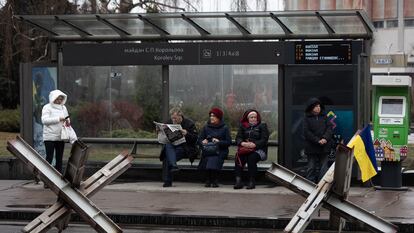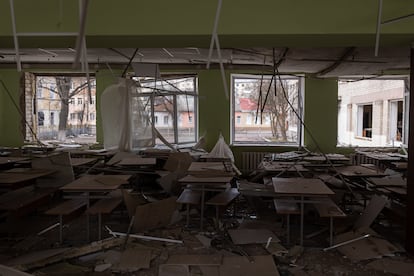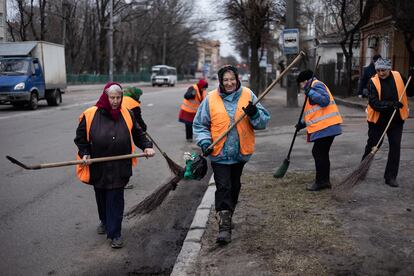Zhytomyr, the Ukrainian city that’s trying to get back to normal under the bombs
Public services and industrial activity are restarting in spite of the Russian attacks. Some people no longer even take shelter when the sirens start blaring

There are 94 families living at number 72 on Pushkin street in Zhytomyr. But that was before March 4, when a Russian missile fell 50 meters from the building, on School No.25 in this city in the north of Ukraine. The building was destroyed and the apartment blocks on Pushkin street, damaged. Today there are around 20 residents still living there, the Horovetz family explains. Most of them left.
The Horovetzs are the only people who on Tuesday morning were seeking shelter in the basement of the block when the air raid sirens went off. “Just a week ago, the shelter was full of the few people still here, but most have gone back to work, which is what the mayor requested,” explains Mikhailov, the father.

Zhytomyr, where 266,000 people once lived, is 130 kilometers west of Kyiv, the Ukrainian capital. Forty percent of the population fled the city to the safest parts of the west of the country, or abroad. The north of Zhytomyr province has witnessed some of the most intense fighting of the war against the Russian invaders.
There have been devastating attacks in the town center, such as the one on March 2, which left Alexandr Korniichuck without a home. Anyone who doesn’t believe in miracles should visit the place where the two-story building that he inherited from his parents is located. He and his wife were in the building at the time, and it is now in ruins. His 12-year-old son had left shortly beforehand to live with his grandparents in the countryside. The couple were rescued from under the rubble; a supporting wall had saved them. In what was the central courtyard of the building is what’s left of their destroyed car. His wife has been left with hearing problems from the explosion and he stopped working for three weeks. He returned to his job as a cellphone technician just a few days ago. “I was reborn on March 2,” he says. “Now what I need is to earn money, and my country needs phone connections.”
The public transportation network started working again last week in Zhytomyr, but every few hours the service is interrupted due to air raid sirens. But the residents stoically accept the situation. “People are adapting,” explains Viktor Kliminskii, secretary of the municipal plenary. “Lots of people don’t even go down to the shelters any more.”
Kliminskii moves around the city wearing a camouflage uniform and a Kalashnikov hanging from his shoulder. He points to the municipal market, which is gradually reopening. “Battles are also won here,” he says, explaining that more and more residents are returning to the city.
According to the council, the companies that are still operating locally – some with up to 3,000 employees – have to follow strict security measures. Employees cannot have their geolocation activated on their phones, because if the enemy detects a large number of people in a single place, they may identify it as a target.

The cleaning crews that tackle the city every morning also stop their activity when there are air raid sirens, before getting back to the task in hand. Teams of volunteers clear the rubble and clean the banks of the River Teteriv, the green lungs of the city. “People need to feel useful and when they are with more people just like them, it becomes a kind of therapy,” explains Mayor Serhii Sukhomlin. He stresses that locals have accepted that a “period that will last a very long time” has just begun: living with the war.
Tu suscripción se está usando en otro dispositivo
¿Quieres añadir otro usuario a tu suscripción?
Si continúas leyendo en este dispositivo, no se podrá leer en el otro.
FlechaTu suscripción se está usando en otro dispositivo y solo puedes acceder a EL PAÍS desde un dispositivo a la vez.
Si quieres compartir tu cuenta, cambia tu suscripción a la modalidad Premium, así podrás añadir otro usuario. Cada uno accederá con su propia cuenta de email, lo que os permitirá personalizar vuestra experiencia en EL PAÍS.
¿Tienes una suscripción de empresa? Accede aquí para contratar más cuentas.
En el caso de no saber quién está usando tu cuenta, te recomendamos cambiar tu contraseña aquí.
Si decides continuar compartiendo tu cuenta, este mensaje se mostrará en tu dispositivo y en el de la otra persona que está usando tu cuenta de forma indefinida, afectando a tu experiencia de lectura. Puedes consultar aquí los términos y condiciones de la suscripción digital.








































